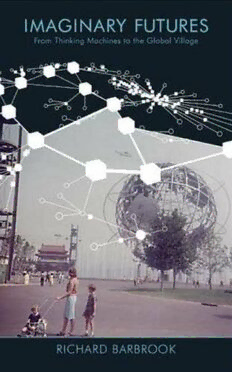Download Imaginary Futures: From Thinking Machines to the Global Village PDF Free - Full Version
Download Imaginary Futures: From Thinking Machines to the Global Village by Richard Barbrook in PDF format completely FREE. No registration required, no payment needed. Get instant access to this valuable resource on PDFdrive.to!
About Imaginary Futures: From Thinking Machines to the Global Village
Winner of the MEA's 2008 Marshall McLuhan Award for Outstanding Book in the Field of Media Ecology.'A compelling, authoritative, and painstakingly documented narrative, Imaginary Futures traces the emergence of the computer era in the context of desperately competing ideologies, economics, and empires. This is a work of passionate and persuasive scholarship by a contemporary social theorist at the top of his game.'Douglas Rushkoff, author, Coercion, Media Virus, Get Back in the Box.'Imaginary Futures gives insight into how the dominant utopias of today were shaped in the time of the Cold War and served the ideological needs of the elites. While the Cold War West had a much better present, it was the Soviet East which had a vision of the future. The invention of a Western utopia became an important factor in the struggle for global power.'Boris Kagarlitsky, Senior Research Fellow, Institute for Comparative Political Studies, Russian Academy of Sciences -- The future is now--Richard Barbrook argues that, at the height of the Cold War, the Americans invented a truly revolutionary tool: the Internet. Yet, for all of its libertarian potential, hi-tech science soon became a tool of geopolitical dominance. The rest of the world was expected to follow America's path into the networked future. Today, we're still told that the Net is creating the information society. Barbrook shows how we can reclaim its revolutionary purpose: how the DIY ethic of the internet can help people shape information technologies in their own interest and reinvent their own, improved visions of the future.
Detailed Information
| Author: | Richard Barbrook |
|---|---|
| Publication Year: | 2007 |
| ISBN: | 9780745326603 |
| Pages: | 342 |
| Language: | English |
| File Size: | 12.53 |
| Format: | |
| Price: | FREE |
Safe & Secure Download - No registration required
Why Choose PDFdrive for Your Free Imaginary Futures: From Thinking Machines to the Global Village Download?
- 100% Free: No hidden fees or subscriptions required for one book every day.
- No Registration: Immediate access is available without creating accounts for one book every day.
- Safe and Secure: Clean downloads without malware or viruses
- Multiple Formats: PDF, MOBI, Mpub,... optimized for all devices
- Educational Resource: Supporting knowledge sharing and learning
Frequently Asked Questions
Is it really free to download Imaginary Futures: From Thinking Machines to the Global Village PDF?
Yes, on https://PDFdrive.to you can download Imaginary Futures: From Thinking Machines to the Global Village by Richard Barbrook completely free. We don't require any payment, subscription, or registration to access this PDF file. For 3 books every day.
How can I read Imaginary Futures: From Thinking Machines to the Global Village on my mobile device?
After downloading Imaginary Futures: From Thinking Machines to the Global Village PDF, you can open it with any PDF reader app on your phone or tablet. We recommend using Adobe Acrobat Reader, Apple Books, or Google Play Books for the best reading experience.
Is this the full version of Imaginary Futures: From Thinking Machines to the Global Village?
Yes, this is the complete PDF version of Imaginary Futures: From Thinking Machines to the Global Village by Richard Barbrook. You will be able to read the entire content as in the printed version without missing any pages.
Is it legal to download Imaginary Futures: From Thinking Machines to the Global Village PDF for free?
https://PDFdrive.to provides links to free educational resources available online. We do not store any files on our servers. Please be aware of copyright laws in your country before downloading.
The materials shared are intended for research, educational, and personal use in accordance with fair use principles.

